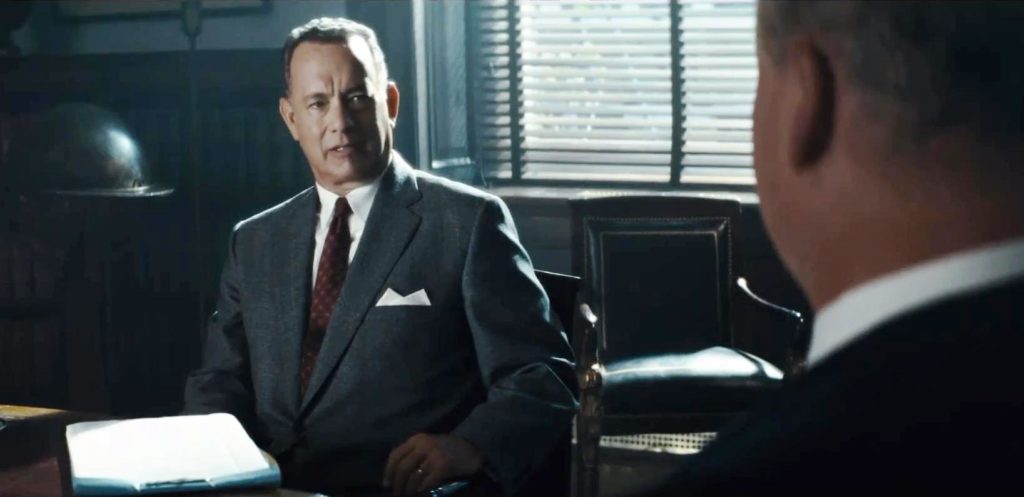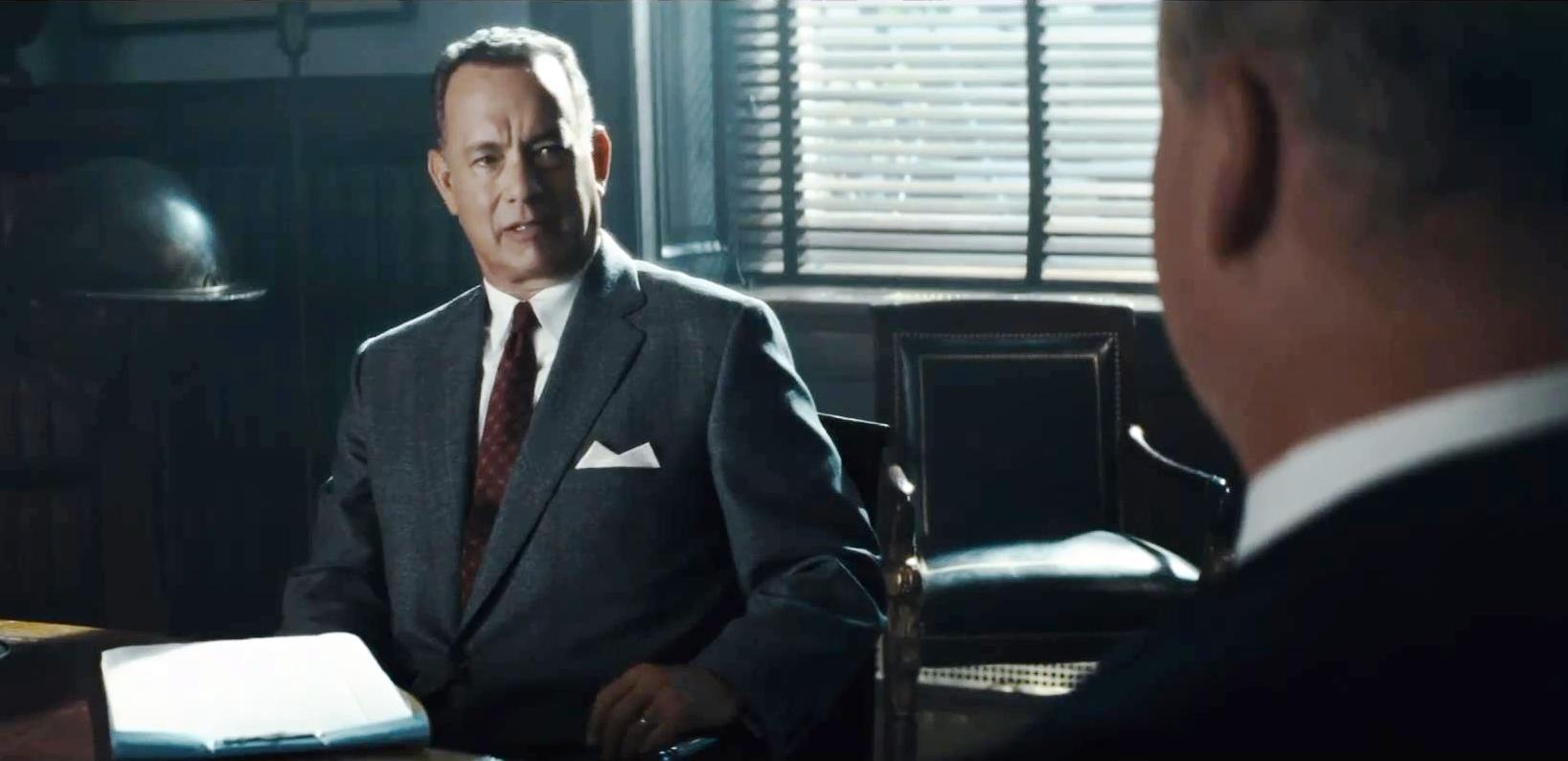In the Tom Hanks Cold War drama, Bridge of Spies, U.S. attorney James Donovan is assigned to defend known Russian spy Rudolf Abel. After predictably losing the case, Donovan persuades the judge to give Abel a prison term instead of a death sentence. At some point in the future, Donovan reasons, the Russians may capture an American and Abel could prove a valuable asset in a trade.

The judge relents and the scenario Donovan describes comes to pass when U-2 spy pilot Francis Gary Powers is captured by the Russians. Donovan is then tasked to negotiate the exchange.
Sitting in a Russian embassy in East Berlin negotiating with his Russian counterpart, the Russian tries to use language to manipulate the attorney.
Schischkin: If we release Powers it is only to promote good will between our countries. So it cannot be an exchange. Perhaps you could release Abel as a token of good will to our friends in Germany, and then some months later we would release Powers, there’s an idea.
Donovan: No, that won’t work for us at all. You see we need this to be an exchange. You can call it what you want, but an exchange it must be. …We need Powers at the same time we give you Abel.
Schischkin: Can we call this “The Impatient Plan”?
Donovan: Call it whatever you want.
In his first week in office, President Trump predictably provoked more controversy. In a visit to CIA headquarters, President Trump said, “…as you know, I have a running war with the media. They are among the most dishonest human beings on Earth. And they sort of made it sound like I had a feud with the intelligence community.”
“In an interview on Fox News,” FactCheck.org writes (Jan. 23), “Trump said the intelligence community did not know who was behind the hacking.
Trump, Dec. 11, 2016: They have no idea if it’s Russia or China or somebody. It could be somebody sitting in a bed some place. I mean, they have no idea.
“In a statement around that time, Trump also questioned the intelligence community’s track record — citing its intelligence work prior to the Iraq war in 2003.
Trump, Dec. 9, 2016: These are the same people that said Saddam Hussein had weapons of mass destruction.
“In a Jan. 3, 2017, tweet,” FactCheck continues, “Trump claimed that intelligence officials had delayed a briefing with him on the Russia report. In that tweet, Trump dismissively used air quotes around the word ‘intelligence’ to describe the briefing, and questioned whether the delay was needed ‘to build a case’ against Russia.
The “Intelligence” briefing on so-called “Russian hacking” was delayed until Friday, perhaps more time needed to build a case. Very strange!
— Donald J. Trump (@realDonaldTrump) January 4, 2017
No sooner had President Trump finished accusing the media of fabricating a “feud,” he accused the media of falsely reporting the number of people who appeared at his inauguration.
“And I turn on — and by mistake I get this network, and it showed an empty field. And it said we drew 250,000 people. Now, that’s not bad, but it’s a lie. … So we caught them, and we caught them in a beauty. And I think they’re going to pay a big price.”
At his first press conference, White House Press Secretary Sean Spicer insisted that, contrary to the facts, Trump’s had been “the largest audience to ever witness an inauguration, period.”
On NBC’s Meet the Press, last Sunday, President Trump’s counselor Kellyanne Conway declared, “our press secretary gave alternative facts to that.”
“Wait a minute,” Host Chuck Todd says, “Alternative facts? … Look, alternative facts are not facts. They’re falsehoods.”
The first Monday, the first day on the job, President Trump, without any evidence, offered up another “alternative fact,” claiming in a meeting with top congressional leaders that he could have won the popular vote if 3 to 5 million illegal immigrants living in the country hadn’t voted.
Why does President Trump fuss over the numbers of people who showed up at his inauguration? Why does he continue to cling to the belief that millions voted illegally? Why does he criticize the intelligence community in a public forum like Twitter and TV, only to turn 180 degrees and accuse the media of inventing a feud that he clearly began?
In July of 2016, The New Yorker magazine interviewed Tony Schwartz, Trump’s ghostwriter for The Art of the Deal.
“Schwartz believes that Trump’s short attention span has left him with ‘a stunning level of superficial knowledge and plain ignorance.’ He said, ‘That’s why he so prefers TV as his first news source—information comes in easily digestible sound bites.’ He added, ‘I seriously doubt that Trump has ever read a book straight through in his adult life.’”
New York Times White House correspondent, Peter Baker confirms (Jan. 25). “He sits in the White House at night, watching television or reading social media, and through Twitter issues instant judgments on what he sees. He channels fringe ideas and gives them as much weight as carefully researched reports. He denigrates the conclusions of intelligence professionals and then later denies having done so. He thrives on conflict and chaos.”
“ ‘Lying is second nature to him,’ Schwartz said. ‘More than anyone else I have ever met, Trump has the ability to convince himself that whatever he is saying at any given moment is true, or sort of true, or at least ought to be true.’ ”
“ ‘Truthful hyperbole’ [Schwartz said] is a contradiction in terms. It’s a way of saying, ‘It’s a lie, but who cares?’ ”
“Starting in late 1985, Schwartz spent eighteen months with Trump… During that period, Schwartz felt, he had got to know him better than almost anyone else outside the Trump family…. as he watched a replay of the new candidate holding forth for forty-five minutes, he noticed something strange: over the decades, Trump appeared to have convinced himself that he had written the book. Schwartz recalls thinking, ‘If he could lie about that on Day One—when it was so easily refuted—he is likely to lie about anything.’ ”
“Alternative Facts”?
Call it whatever you want. They’re still wrong.
“Truthful hyperbole”?
Call it whatever you want. It’s still a lie.
3-5 million illegal votes?
Call it whatever you want. It’s not only wrong; it’s reckless and irresponsible.
Comments
Leave a Comment












Jim-I always enjoy reading your website and everything you write makes sense about him, but reputations of politicians is that they all stretch the truth. Our president obviously has thin skin, but it seems this fight with the media wont go away anytime soon, unfortunately. It’s going to be a long four years for both sides of the aisle. I look forward to reading your take on all the issues.